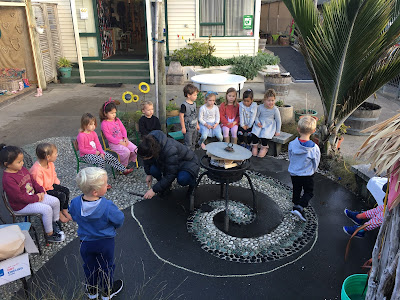The creation of fire is an essential factor of a nature programme. It is one of the four elements and provides opportunities for children to experience success and self-accomplishment when starting a fire from scratch that will ultimately cook food.
After a long period in lockdown in our own little bubbles it is time to start returning to “normal” life. One thing that has definitely changed since we left is the season! We have returned to kindergarten wearing gummies, beanies, raincoats and scarves. A far cry from the togs and jandals that were once a daily essential.
With the colder season comes a weekly ritual that is very close to our hearts… Fire Day. We feel so thankful to be able to cook together again, sharing kai with others is something that we hold dear to our hearts at Mairtown kindergaten.
Cooking is all about people. Food is maybe the only universal thing that really has the power to bring everyone together. No matter what culture, everywhere around the world, people get together to eat. (Guy Fieri)
This is our ninth year of having weekly fires during the winter months at Mairtown, fondly known by the children as ‘Fire Thursday’, due of course, to the fact that we hold our fires on Thursday mornings. The benefits it offers to our tamariki include developing more confidence, safety awareness and better risk assessment skills whilst around fire.
There are obviously significant risks associated with fires, and we take very seriously our roles as kaiako/teachers to plan and manage for these carefully. Leading up to our first fire day we engage in a great deal of discussion about these risks during our morning whānau time.
Here, the children who were at kindergarten last year take the tuakana role in sharing with the teina/younger ones what they remember about fire day. As a group we go over every step and discuss each potential danger and the rules put in place to eliminate or minimise these risks.
‘By implementing risky play in a secure environment as part of early learning, teachers can ensure young children feel confident to engage with risk safely under supervision rather than on their own’ (Ariane Beeston)
Other learning opportunities for our tamariki include:
Mathematical and science concepts - Preparing a fire with paper and laying wood for a base.
Science concepts – how heat changes objects.
Cooking – with use of hand held paddles and pokers.
Ethic of care in looking after your friends.
Health and safety and how to manage risks.
Working together as a collaborative community.
And most importantly children learn an awareness and respect for fire.
So what does fire day actually look like at Mairtown kindergarten!?
We begin by preparing the kai whether it be bread dough, sauasages, pancake mixture or marshmellows. At present the food preparation is done by the kaiako due to Covid-19 precautions.
Preparing the fire. The tamariki have great expertise and knowledge of what is required to get the fire going. There are always keen helpers to scrunch the newspaper, and stack the kindling ready for the teachers to light.
One last discussion at whānau time provides an excellent opportunity to share ideas about how to be safe around the fire. We actually bring our fire (not lit) inside onto our mat, prior to fire day where we get our children to role model how to keep themselves safe around the fire. Important rules that we have in place are:
"No scarves, no capes, no tu-tu's and NO swapping seats" - Alena
"No toys around the fire" - Kelsi
"Sit and down and be sensible or you will be sent away and you have to hold the paddles with two strong hands" - Amalia
"Stand behind the safety bubble" - Finlay
Sometimes once the fire is lit it can take a little while for the fire to heat up enough to start cooking. These times can provide the perfect opportunity for our children to practice patience, while they wait for their turn to cook. It is a valuable lifelong skill to learn patience and know that they will eventually get to cook.
Childspace explains Patience is about waiting and having confidence in a positive outcome. When we are patient we are able and willing to suppress restlessness or annoyance when confronted with delay. We work with quiet, steady perseverance and diligence.
When the fire is ready the tamariki are passed the paddles. The kaiako then place the kai on the paddle and step back as the tamariki cook. Once cooked the kaiako take the kai off the paddle, and hand it to the child once they have passed their paddle to another child. They then take their kai to the stairs to sit and eat, yum!
It really is magical, sitting around the warm fire on a winter’s day, watching as the flames flicker and dance, the smoke twirling in the breeze. What could be better than chatting and cooking delicious kai, side by side with your friends, creating many new memories and skills for lifelong learning.
Nga mihi,
Hanna Bramley
























No comments:
Post a Comment